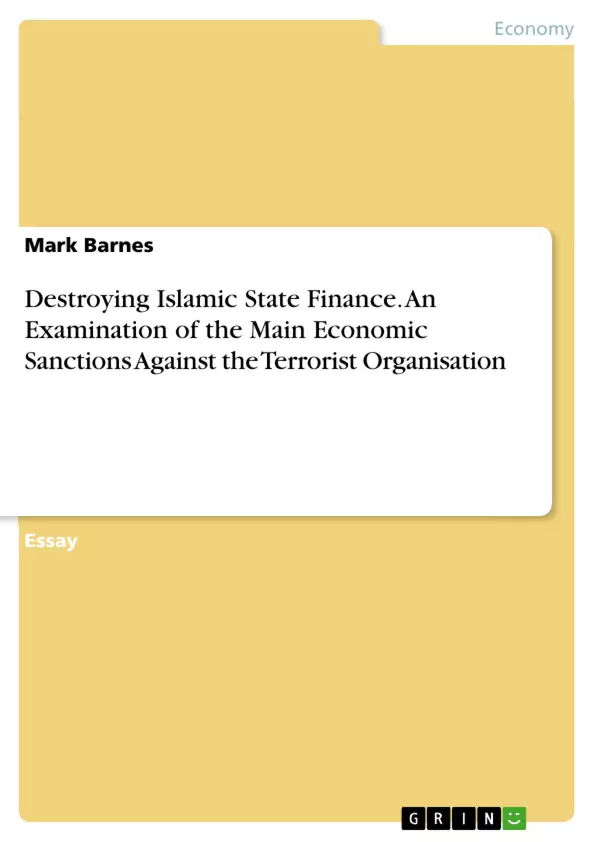Recent news surrounding the battles in Iraq and Syria give the impression that the Islamic State is losing many of their important gains and will eventually succumb. This, however, is not the time to withdraw the pressure from the Islamic State. They still have a vast arrange of ways of collecting money from a variety of financial sources. The international community has to keep the pressure not just on the battlefield but also on the banks and assets that the Islamic State has managed to get a hold of.
It is well documented how the Islamic State was able to take and contain hold of significant amount of territories in Iraq and Syria. The failures of the Iraqi government and the uprising against the Syrian government helped lead to Islamic State victories on the battlefield. Before those battles even began, though, there was a significant amount of financial and material resources in the hands of the Islamic State.
This paper identifies how the Islamic State gets its revenues, examines the main economic sanctions that have taken place against the terrorist organization, then goes through their individual sources of revenue and analyzes what has been done and what more the international community can do in order to stop the Islamic State from taking in such large amounts of money.
Inhaltsverzeichnis (Table of Contents)
- Sources of Revenue for the Islamic State
- Sanctions adopted against the Islamic State
- ISIS's Sources of revenue: What is being done, and what more can be done.
- Oil
- Hostage Taking
- Donations
- Other Sources
- Conclusion
Zielsetzung und Themenschwerpunkte (Objectives and Key Themes)
This paper investigates the financial resources of the Islamic State, analyzing their methods of revenue generation and examining the effectiveness of international sanctions aimed at curbing their financial capabilities. The paper aims to understand the diversity of the Islamic State's revenue sources, explore the challenges of countering these sources, and discuss potential strategies for mitigating their financial strength.
- The Islamic State's financial sources and their impact on the organization's activities
- The effectiveness of international sanctions in disrupting the Islamic State's financial network
- The need for coordinated international efforts to target specific revenue sources and prevent financial support
- The importance of understanding the Islamic State's financial strategies to combat their influence
- The potential for future research in this area to inform counterterrorism strategies
Zusammenfassung der Kapitel (Chapter Summaries)
The paper begins by exploring the diverse financial sources of the Islamic State, highlighting the importance of oil revenues, taxation of local populations, and kidnapping for ransom. The author analyzes the Islamic State's ability to leverage their control over territories in Iraq and Syria to generate substantial income.
The next section focuses on the international community's efforts to combat the Islamic State's financial network through sanctions. The paper examines the role of the United Nations Security Council in implementing sanctions and highlights the individual actions taken by nation-states, such as the United States, to freeze assets and restrict financial transactions.
The paper delves into the Islamic State's oil revenue, examining the effectiveness of airstrikes targeting oil facilities and the impact of the killing of key figures involved in the group's oil operations. The paper also explores the need for a more robust international coalition to disrupt the Islamic State's oil revenue streams.
The chapter on hostage taking discusses the significant revenue generated by the Islamic State through kidnapping and ransom payments. The paper explores the various approaches taken by governments when dealing with kidnapped citizens and the challenges associated with negotiating with the Islamic State.
Schlüsselwörter (Keywords)
The primary focus of this paper is on the Islamic State's financial resources, exploring their revenue sources, the effectiveness of sanctions, and the strategies for disrupting their financial network. The paper examines the role of international organizations, such as the United Nations Security Council, in combating the Islamic State's finances. Key concepts include oil revenue, taxation, kidnapping for ransom, sanctions, counterterrorism strategies, and the impact of financial resources on terrorist organizations.
Frequently Asked Questions
How does the Islamic State generate its revenue?
The Islamic State generates revenue through diverse sources, including oil sales, taxation of local populations, kidnapping for ransom, and private donations.
What is the role of international sanctions against ISIS?
International sanctions, led by the UN Security Council and individual states, aim to freeze assets and restrict the financial transactions of the terrorist organization to curb its power.
Why is oil revenue significant for the Islamic State?
Oil has been a major source of income, allowing the group to fund military operations and maintain control over territories in Iraq and Syria.
How has the international community responded to ISIS's oil trade?
Responses include airstrikes on oil facilities and targeting key figures involved in the group's oil production and distribution networks.
What challenges exist in stopping kidnapping for ransom?
Different governments have varying policies on paying ransoms, which can complicate international efforts to eliminate this source of funding.
- Citation du texte
- Mark Barnes (Auteur), 2016, Destroying Islamic State Finance. An Examination of the Main Economic Sanctions Against the Terrorist Organisation, Munich, GRIN Verlag, https://www.grin.com/document/337512



